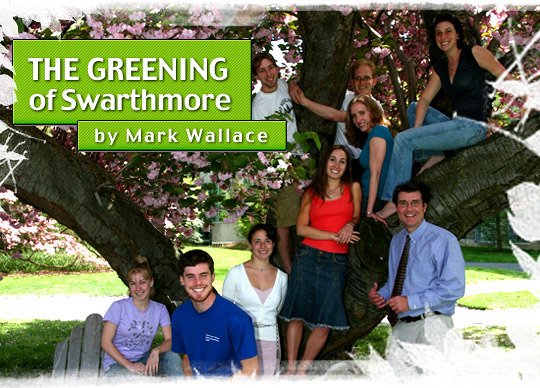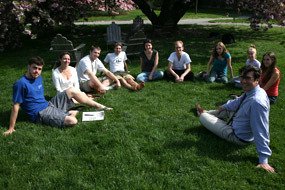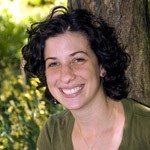The Greening of Swarthmore

 am deeply concerned about the failure of our national leaders to articulate a meaningful and coherent sustainability policy for our nation's future. Giving speeches about voluntary restrictions on carbon emissions is not enough. In light of this failure, it is imperative that America's colleges and universities be leaders in promoting sustainability. (The steps that Swarthmore has taken are featured on the College's Sustainability Web site.)
am deeply concerned about the failure of our national leaders to articulate a meaningful and coherent sustainability policy for our nation's future. Giving speeches about voluntary restrictions on carbon emissions is not enough. In light of this failure, it is imperative that America's colleges and universities be leaders in promoting sustainability. (The steps that Swarthmore has taken are featured on the College's Sustainability Web site.)The great work of this generation is to develop sustainable lifestyles that kick the habit of dependence on fossil fuels, the primary source of global climate change. So I designed this year's Environmental Studies capstone seminar to respond to the challenge of re-envisioning Swarthmore as a model of environmental campus leadership in a time of political crisis, global climate change, dwindling natural resources, and a massive loss of biodiversity across the planet.
The course is predicated on the assumption that urgent action is needed to reverse unprecedented environmental degradation in our time. As glaciers melt, sea levels worldwide could rise by more than 20 feet and flood shore communities from downtown Manhattan to Bangladesh. More than 30,000 plant and animal species a year are driven to extinction. Even the polar bear is now proposed as a threatened species.
 From left: Jamie Kingston '07, Sarah Manion '07, Colton Bangs '07, Jonathan Stott '07, Martha Hoffman '07, Aaron Hollander '07, Kristin Leitzel '07, Lissie Jaquette '07, Juliet Braslow '07, and Mark Wallace.
From left: Jamie Kingston '07, Sarah Manion '07, Colton Bangs '07, Jonathan Stott '07, Martha Hoffman '07, Aaron Hollander '07, Kristin Leitzel '07, Lissie Jaquette '07, Juliet Braslow '07, and Mark Wallace.The course - The Green Campus: Swarthmore and Sustainability - was the anti-course. I didn't set a pre-determined agenda and didn't lecture. Instead, it was student-driven and vigorously discussion-based. Readings included academic studies of campus sustainability strategies along with works of imagination and vision. We researched sustainability philosophy and practice at different levels of the curriculum and administration. In addition, we evaluated current policies regarding, for example, energy efficiency, green building design, waste management, water conservation, sustainable transportation, and community-supported agriculture.
Students brought in outside experts to advise us, organized field trips, and ultimately wrote a sustainability plan. Together, we discussed how to make the plan compelling and applicable to the wider community. Now that the plan is complete, we are working to bring it into action on campus.
Sustainability Web Site

To learn more about environmental initiatives at Swarthmore College, please visit the Sustainability web site.
Course Bibliography
- Peggy Barlett and Geoffrey Chase, Sustainability on Campus: Stories and Strategies for Change
- Thomas Berry, The Great Work: Our Way into the Future
- Sarah Hammond Creighton, Greening the Ivory Tower: Improving the Environmental Track Record of Universities, Colleges, and Other Institutions
- Al Gore, An Inconvenient Truth: The Planetary Emergency of Global Warming
- David Orr, Earth in Mind: On Education, the Environment, and the Human Prospect
Mark Wallace
 In Spring 2007, students in Professor of Religion Mark Wallace's environmental studies capstone seminar produced a sustainability action plan for the campus. The College's sustainability efforts, as well as the plan, are now featured on a new site, The Greening of Swarthmore. Wallace, a member of the faculty since 1989, frequently takes his classes into the Crum Woods on Swarthmore's campus and is co-chair of the Crum Woods Stewardship Committee. In Finding God in the Singing River (2005), he argues that a crucial blueprint for meeting the planet's environmental crisis lies in a perhaps surprising source: the Christian Bible. Write to him at mwallac1@swarthmore.edu.
In Spring 2007, students in Professor of Religion Mark Wallace's environmental studies capstone seminar produced a sustainability action plan for the campus. The College's sustainability efforts, as well as the plan, are now featured on a new site, The Greening of Swarthmore. Wallace, a member of the faculty since 1989, frequently takes his classes into the Crum Woods on Swarthmore's campus and is co-chair of the Crum Woods Stewardship Committee. In Finding God in the Singing River (2005), he argues that a crucial blueprint for meeting the planet's environmental crisis lies in a perhaps surprising source: the Christian Bible. Write to him at mwallac1@swarthmore.edu.Martha Hoffman '07
 "This course did a fantastic job of allowing us to apply both the knowledge we gained at Swarthmore and the passion we all feel about the environment. While we drew from what we learned in our various fields of study, the class itself was nothing like any other course at the College. The class provided a nice transition from the academic world to the practical life beyond Swarthmore by encouraging us to use our knowledge to achieve concrete goals."
"This course did a fantastic job of allowing us to apply both the knowledge we gained at Swarthmore and the passion we all feel about the environment. While we drew from what we learned in our various fields of study, the class itself was nothing like any other course at the College. The class provided a nice transition from the academic world to the practical life beyond Swarthmore by encouraging us to use our knowledge to achieve concrete goals."Kristin Leitzel '07
 "This course has opened my eyes to the complicated world of institutions. It has also given me great hope that, when dedicated people work together, great things can happen. I hope that Swarthmore will fulfill its role as a standard of ethical intelligence and become one of the leading academic institutions in the move towards environmental responsibility. There is so much potential for Swarthmore to become an example of what is possible."
"This course has opened my eyes to the complicated world of institutions. It has also given me great hope that, when dedicated people work together, great things can happen. I hope that Swarthmore will fulfill its role as a standard of ethical intelligence and become one of the leading academic institutions in the move towards environmental responsibility. There is so much potential for Swarthmore to become an example of what is possible."

